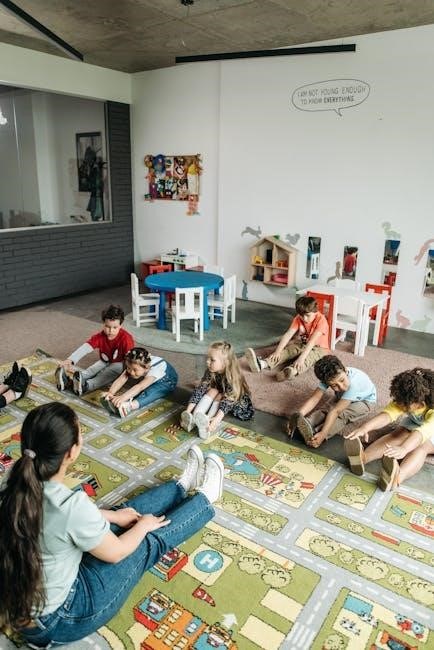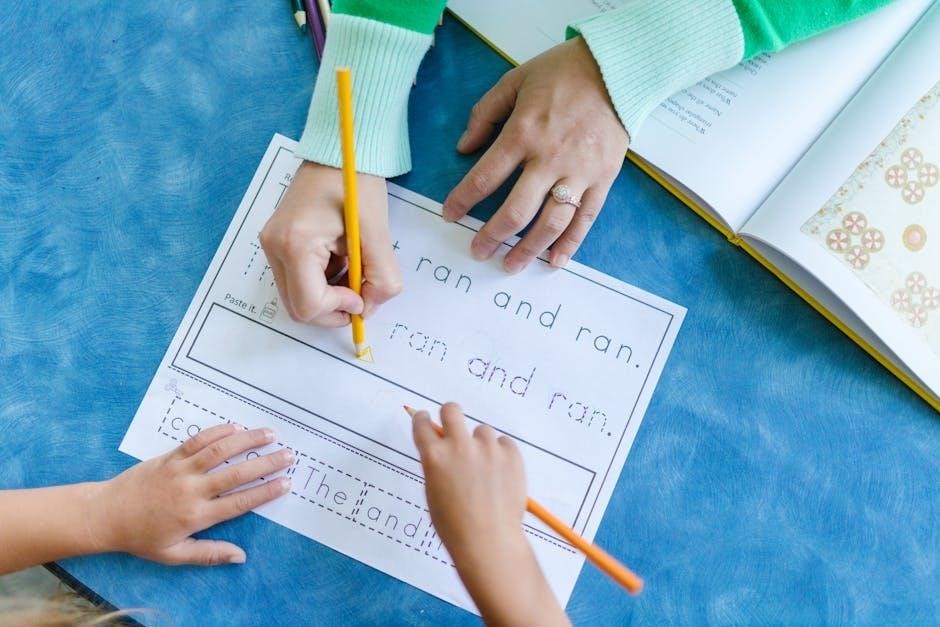Gifted and talented practice tests for kindergarten are designed to identify and nurture young learners with advanced abilities. These tests help prepare children for challenges ahead.
Free PDF resources offer convenient and accessible tools for parents and educators to assess and develop gifted children’s skills effectively from an early age.
What Are Gifted and Talented Practice Tests?
Gifted and talented practice tests are specialized assessments designed to identify and evaluate the advanced cognitive abilities of young children. These tests measure skills such as problem-solving, critical thinking, and creativity, helping to pinpoint exceptional talents early on.
They often include questions and activities tailored to kindergarten-level understanding, ensuring age-appropriate challenges. By using these tests, educators and parents can gain insights into a child’s potential and prepare them for future academic opportunities. Free PDF versions make these resources widely accessible for home or classroom use, fostering early identification and growth of gifted children.
Why Are These Tests Important for Kindergarten Students?
Gifted and talented practice tests are crucial for identifying young children with exceptional abilities early in their academic journey. These assessments help educators and parents recognize advanced cognitive skills, ensuring students receive appropriate challenges and resources. Early identification prevents underachievement and fosters intellectual growth.
By using these tests, kindergarten students gain a head start in developing their talents. They also provide a foundation for future academic success, helping to guide teaching methods and parental support tailored to their unique needs. This ensures gifted children thrive in a nurturing and stimulating environment.
How to Identify Gifted and Talented Children in Kindergarten
Identifying gifted and talented children in kindergarten involves observing advanced cognitive, social, and creative abilities. Look for early signs such as rapid learning, complex problem-solving, and a strong curiosity about the world. Teachers and parents can use practice tests and checklists to assess skills like advanced vocabulary and conceptual understanding. Providing enriching activities and challenging tasks helps reveal exceptional talents. A nurturing environment that encourages exploration and creativity supports the identification process, ensuring these children receive the support they need to thrive.

Understanding the Structure of Gifted and Talented Tests
Gifted and talented tests for kindergarten are structured to assess advanced skills through age-appropriate questions, focusing on math, reading, and problem-solving abilities, with clear instructions and time limits.
Key Components of Kindergarten Gifted Tests
Kindergarten gifted tests typically include problem-solving tasks, critical thinking exercises, and creative activities. These assessments evaluate verbal, non-verbal, and spatial reasoning skills. They also measure memory, attention, and logical reasoning abilities. Many tests incorporate age-appropriate questions to ensure fairness and accuracy. The components are designed to identify advanced learning capabilities and readiness for accelerated programs. Free PDF resources often mirror these structures, providing parents and educators with tools to prepare students effectively. These tests are essential for early identification of giftedness and tailored educational planning.
Skills Assessed in Gifted and Talented Practice Tests
Gifted and talented practice tests for kindergarten assess a range of skills, including logical reasoning, problem-solving, and critical thinking. They evaluate verbal and non-verbal abilities, such as pattern recognition and spatial awareness. Memory, attention, and creativity are also key areas of focus. These tests often incorporate age-appropriate activities to gauge advanced vocabulary and math concepts. The goal is to identify students who demonstrate exceptional cognitive abilities and readiness for enriched learning experiences. Free PDF resources provide structured assessments to help parents and educators evaluate these skills effectively.
Common Formats of These Tests
Gifted and talented practice tests for kindergarten often feature engaging formats to suit young learners. Common formats include multiple-choice questions, puzzles, and interactive activities. Many tests incorporate visual and auditory elements to assess diverse skills. Some tests use game-like exercises to make learning fun and less stressful. Free PDF resources typically offer structured worksheets, coloring activities, and pattern-recognition tasks. These formats are designed to evaluate critical thinking, creativity, and problem-solving abilities in a developmentally appropriate manner. They also aim to keep children motivated and interested throughout the assessment process.

How to Prepare for Gifted and Talented Practice Tests
Preparation involves introducing a structured study routine, using interactive activities, and incorporating play-based learning to build cognitive skills. Utilize free PDF resources for engaging practice materials.
Strategies for Effective Test Preparation
Effective test preparation involves a combination of structured learning and interactive activities. Use free PDF resources to access practice tests that align with curriculum standards. Incorporate play-based learning to enhance cognitive development while keeping the process engaging. Introduce a study routine that balances fun with focused practice, ensuring young learners stay motivated. Utilize educational apps and online tools to reinforce concepts and track progress. Encourage critical thinking through puzzles and creative exercises. Maintain a positive environment that fosters curiosity and confidence, allowing children to thrive during preparation.
Resources for Parents and Teachers
Parents and teachers can access free PDF practice tests designed for kindergarten students. These resources are available on educational websites and school portals, offering a variety of questions aligned with curriculum standards. Interactive tools, such as flashcards and worksheets, complement test preparation. Many platforms provide downloadable materials that cater to gifted and talented learners. Additionally, educational apps and online games can reinforce learning concepts. Parents and educators are encouraged to explore these resources to create a structured and engaging study plan, ensuring young learners are well-prepared for assessments.
Creating a Study Plan for Kindergarten Students
Developing a structured study plan for kindergarten students ensures consistent progress and readiness for gifted and talented assessments. Begin by breaking learning into short, engaging sessions, focusing on key skills like problem-solving and critical thinking. Incorporate play-based activities to maintain interest and motivation. Use free PDF practice tests to identify strengths and areas needing improvement. Set clear, achievable goals and track progress weekly. Balance structured learning with free play to foster creativity and emotional growth. Ensure the plan is adaptable, allowing flexibility based on the child’s responses and developmental pace.
Free PDF Resources for Gifted and Talented Tests
Free PDF resources for gifted and talented tests are widely available online, offering convenient access to practice materials for kindergarten students and educators.
Where to Find Free PDF Practice Tests Online
Free PDF practice tests for gifted and talented kindergarten students are available on educational websites, forums, and library databases. Use specific search terms like “gifted and talented practice test for kindergarten PDF free” to locate resources. Websites such as Google, educational portals, and non-profit organizations often provide these materials. Additionally, many schools and teachers share free resources online. Utilize advanced search techniques, such as using quotes for exact phrases, to find reliable and relevant materials. Always verify the quality and alignment of the tests with curriculum standards before downloading.
Popular Websites Offering Free Gifted Test Materials
Several websites provide free PDF materials for gifted and talented tests tailored for kindergarteners. Educational platforms like Google Classroom, Teachers Pay Teachers, and Khan Academy often offer free resources. Non-profit organizations and educational forums also share downloadable practice tests. Additionally, some school districts publish free gifted test materials online. When searching, use keywords like “gifted and talented practice test for kindergarten PDF free” to locate these resources. Always verify the credibility of the source and align the materials with curriculum standards before use.
How to Download and Use These Resources Effectively
To download gifted and talented practice tests, visit reputable websites like Teachers Pay Teachers or educational forums. Use specific search terms such as “gifted and talented practice test for kindergarten PDF free” to locate materials. Once downloaded, print or access digitally, depending on the child’s preference. Create a structured study plan, focusing on one skill at a time. Use the tests to identify strengths and areas for improvement. Involve educators for personalized feedback and ensure the materials align with curriculum standards for optimal learning outcomes.

Administering Practice Tests at Home

Administering Practice Tests at Home
Ensure a quiet, distraction-free environment for administering practice tests. Use timers and clear instructions to mimic formal settings. Provide breaks to maintain engagement and reduce stress.
Best Practices for Conducting Tests at Home
Creating a quiet, organized environment is essential for effective test administration. Establish a routine to familiarize your child with the testing process. Use timers to simulate real test conditions and provide clear instructions to avoid confusion. Minimize distractions by turning off electronics and ensuring privacy. Offer breaks between sections to prevent overwhelm. Maintain a positive atmosphere to reduce anxiety and encourage effort. Tailor your approach to your child’s needs, ensuring they feel comfortable and supported throughout the process. This helps in achieving accurate and reliable test results.
Creating a Conducive Environment for Testing
A well-prepared space is crucial for effective testing. Ensure the room is quiet, free from distractions, and filled with natural light. Organize materials neatly and within reach to promote focus. A child-sized desk and chair can enhance comfort. Psychological preparation is equally important—encourage a growth mindset and calm nerves with positive affirmations. Familiarize your child with test formats beforehand to reduce anxiety. A clutter-free and visually appealing environment fosters concentration, making the testing experience more productive and enjoyable for young learners.
Interpreting Test Results for Kindergarten Students
Interpreting test results for kindergarten students involves understanding their performance in relation to age-appropriate benchmarks. Look for percentiles or rubrics that highlight advanced abilities; Qualitative observations, such as problem-solving skills or creative thinking, are equally important. Parents and educators should focus on identifying strengths and areas for growth; Use the results to tailor learning activities and provide enrichment opportunities. Celebrate achievements while addressing any learning gaps. Remember, tests are tools to guide development, not define a child’s potential. Collaborate with teachers to create a balanced and nurturing approach for gifted learners.

Common Mistakes to Avoid in Gifted Testing
Overpreparing and misinterpreting results are common mistakes. Ensure tests reflect natural abilities and create a calm environment to avoid skewing outcomes and misleading assessments.
Mistakes Parents Make When Preparing for Tests
Overpreparation is a common mistake, leading to unnecessary stress and burnout. Parents often use ineffective resources that lack alignment with test formats. Misinterpreting test results is another error, as scores may not reflect a child’s true potential. Some parents neglect to maintain a balanced routine, focusing excessively on academics while ignoring play and creativity. Additionally, they may overlook the emotional needs of their child, failing to provide reassurance and a supportive environment. Avoiding these pitfalls ensures a healthier, more effective preparation process for young learners.
Common Errors in Test Administration
Common errors in test administration include improper timing, failure to follow test instructions, and creating a distracting environment. Misinterpreting test formats or neglecting to provide necessary materials can also hinder a child’s performance. Additionally, test administrators may overlook the need for clear instructions or fail to maintain a neutral and encouraging demeanor. Ensuring a quiet, well-prepared setting and adhering strictly to test guidelines helps minimize errors and provides an accurate assessment of a child’s abilities. Attention to detail is crucial for valid and reliable test results.
How to Ensure Accurate Test Results
To ensure accurate test results, it’s essential to follow test guidelines strictly. Use Boolean operators like AND, OR, and NOT to refine search queries for relevant materials. Create a quiet, well-prepared environment free from distractions, and provide clear instructions to the child. Adhere to time limits and ensure the child understands each question before answering. Avoid interruptions and maintain a neutral, encouraging demeanor to reduce anxiety; These steps help produce reliable and valid outcomes, reflecting the child’s true abilities accurately.

Incorporating Play-Based Learning into Test Prep
Play-based learning enhances creativity and problem-solving skills, making test prep engaging for kindergartners. It fosters a love for learning while preparing them for challenges effectively.
How Play Enhances Cognitive Development
Play-based learning significantly enhances cognitive development by fostering creativity, problem-solving, and critical thinking. Interactive games and activities stimulate curiosity and imagination, essential for gifted learners. Through play, children develop spatial awareness, memory, and logical reasoning skills, which are crucial for academic success. It also promotes social skills like collaboration and communication, preparing kindergartners for challenges. By integrating play into test preparation, educators create an engaging environment where children can thrive and develop a strong foundation for future learning.
Using Games to Reinforce Learning Concepts
Games are an effective way to reinforce learning concepts for kindergarten students. Interactive activities make complex ideas engaging and fun, ensuring better retention. Educational games enhance problem-solving skills and logical thinking, while also fostering creativity. They provide hands-on experiences, allowing children to explore and understand concepts deeply. For gifted learners, games can accelerate their grasp of advanced topics, making learning both enjoyable and challenging. Incorporating games into test preparation helps build confidence and readiness for academic success in a playful, stress-free manner.
Balancing Play and Structured Learning
Balancing play and structured learning is essential for kindergarten students, especially those who are gifted and talented. Play fosters creativity, critical thinking, and social skills, while structured learning provides foundational knowledge and discipline. A blend of both approaches ensures well-rounded development. Play-based activities can be incorporated into test preparation to make it engaging and fun. Meanwhile, structured learning helps build focus and academic readiness. By combining these methods, educators and parents can create a nurturing environment that supports both intellectual growth and emotional development, preparing children for future challenges effectively.
Using Digital Tools for Gifted Test Preparation
Digital tools enhance learning through interactive activities, making test prep engaging for kindergarten students. Educational apps and online platforms provide structured practice, fostering cognitive growth and skill development effectively.
Educational Apps for Kindergarten Students
Educational Apps for Kindergarten Students
Educational apps are a valuable resource for gifted kindergarten students, offering interactive and engaging activities that align with their advanced learning needs. These apps often include puzzles, logic games, and creative exercises designed to enhance problem-solving skills and critical thinking. Many apps focus on math, reading, and science, providing a structured yet fun way to prepare for gifted and talented tests. By incorporating these tools, parents and teachers can create a dynamic learning environment that fosters intellectual growth and builds confidence for future challenges.
Interactive Online Tools for Test Prep
Interactive online tools for gifted and talented test prep offer engaging and dynamic learning experiences for kindergarten students. These tools often feature colorful animations, games, and puzzles that make learning fun while assessing cognitive abilities. Many platforms provide progress tracking, allowing parents and educators to monitor development. Interactive activities typically focus on math, language, and logic skills, mirroring the content of gifted and talented tests. These tools not only prepare children for assessments but also foster a love for learning through playful and challenging exercises tailored to their advanced capabilities.
The Role of Technology in Modern Education
Technology plays a pivotal role in modern education, offering innovative tools for gifted and talented test preparation. Interactive platforms and educational apps provide engaging ways for kindergarten students to practice skills like problem-solving and critical thinking. Digital resources, such as free PDF practice tests, are easily accessible and convenient for parents and educators. Technology also enables personalized learning experiences, allowing children to progress at their own pace. By integrating tech-based solutions, educators can create dynamic and effective learning environments that cater to the unique needs of gifted students, fostering their cognitive and creative growth. This approach ensures a strong foundation for future academic success.

The Role of Parents in Gifted and Talented Education
Parents play a crucial role in nurturing gifted children by providing enrichment, emotional support, and fostering curiosity. They can utilize free PDF resources and educational apps to enhance learning at home, reinforcing classroom efforts and encouraging a love for learning.
By creating a stimulating environment and staying involved in their child’s education, parents help gifted children thrive academically and socially.
How Parents Can Support Their Child’s Learning
Parents can support their child’s learning by providing enriching activities and resources, such as free PDF practice tests for gifted and talented exams. Encourage curiosity and creativity through play-based learning and interactive educational tools. Utilize digital apps designed for kindergarteners to reinforce skills like problem-solving and critical thinking. Create a structured yet flexible study plan that aligns with their interests and abilities. Maintain open communication with teachers to stay informed about their progress. Praise effort and celebrate milestones to foster confidence and a love for learning. Provide a nurturing environment that balances play and structured activities, ensuring holistic development.
Communicating with Teachers About Gifted Programs
Open communication with teachers is crucial for supporting a child’s gifted education. Regularly discuss their progress, strengths, and areas for growth. Ask about how practice tests align with the curriculum and how results are interpreted. Inquire about additional resources, such as free PDF materials, that can enhance learning. Use specific search terms and strategies, like Boolean operators, to find relevant information together. Collaborate on creating a study plan and explore ways to integrate play-based learning. Show interest in their daily activities and seek advice on fostering a love for learning. Staying informed ensures a cohesive approach to your child’s development.
Encouraging a Love for Learning at Home
Creating a nurturing environment at home fosters a child’s natural curiosity and love for learning. Engage your child in daily activities that spark creativity, such as puzzles, reading, and imaginative play. Use free PDF practice tests to introduce structured learning in a fun way. Celebrate their achievements and encourage exploration of new concepts. Provide access to educational resources and discuss their interests openly. Balancing play and structured activities helps build a strong foundation for lifelong learning and intellectual growth.

Understanding Gifted and Talented Identification Processes
Schools use standardized tests, teacher observations, and assessments to identify gifted children. These processes help determine if a child demonstrates advanced abilities requiring specialized education.
How Schools Identify Gifted and Talented Students
Schools identify gifted and talented students through a combination of methods, including standardized tests, teacher recommendations, and assessments of cognitive abilities. IQ tests, like the Cognitive Abilities Test (CAT4), are commonly used to measure intellectual capabilities. Additionally, observations of academic performance, creativity, and problem-solving skills play a significant role. Some schools also administer kindergarten readiness assessments to evaluate early signs of advanced learning. Parents and educators often collaborate to ensure accurate identification, providing support through resources like free PDF practice tests to prepare young learners for these evaluations.
The Role of Standardized Tests in Identification
Standardized tests play a critical role in identifying gifted and talented students by providing measurable data on cognitive abilities and academic readiness. Tests like the Cognitive Abilities Test (CAT4) assess reasoning, problem-solving, and thinking skills, helping schools pinpoint advanced learners. These assessments ensure fairness and consistency in evaluating students from diverse backgrounds. By administering standardized tests, educators can objectively identify those who may benefit from enriched learning programs. Such tests are often complemented by additional evaluations to ensure comprehensive identification of gifted potential in young learners. Accurate results guide tailored educational plans for exceptional students.
Alternative Methods for Identifying Gifted Children
Beyond standardized tests, alternative methods like teacher observations, portfolio reviews, and peer nominations can identify gifted children. Teachers often notice advanced skills, creativity, or leadership in the classroom. Portfolios showcasing artwork, writing, or projects highlight exceptional abilities. Additionally, nominations from peers or parents provide insights into a child’s intellectual and social strengths. These methods offer a more holistic view of a child’s potential, complementing test results and ensuring diverse talents are recognized. They also accommodate different learning styles and cultural backgrounds, promoting inclusivity in gifted identification processes.

Aligning Practice Tests with Kindergarten Curriculum
Aligning practice tests with kindergarten curriculum ensures they reflect learning objectives, helping students apply skills effectively and preparing them for academic success in a structured manner.
Curriculum Standards for Kindergarten
Kindergarten curriculum standards focus on foundational skills in literacy, numeracy, and social-emotional development. These standards guide the creation of gifted and talented practice tests to ensure alignment with learning objectives. Tests are designed to assess advanced understanding and readiness for challenging content. By matching test content to curriculum standards, educators ensure that gifted students are appropriately challenged and prepared for future academic success. This alignment also helps identify areas where students may need additional support or enrichment.
Matching Test Content to Learning Objectives
Gifted and talented practice tests for kindergarten are carefully designed to align with learning objectives, ensuring they measure skills like problem-solving, critical thinking, and creativity. Tests often include activities that reflect curriculum standards, such as pattern recognition, shape identification, and basic math concepts. This alignment helps educators assess whether students are ready for advanced challenges. By matching test content to learning goals, these tools effectively identify gifted students and prepare them for more complex tasks, fostering their intellectual growth and readiness for advanced learning programs.
Ensuring Test Readiness for Young Learners
Ensuring test readiness for young learners involves creating a familiar and comfortable environment to reduce anxiety. Parents and educators can use free PDF practice tests to introduce children to test formats and content gradually. These resources help assess readiness by focusing on age-appropriate skills like problem-solving and critical thinking. By familiarizing kindergarten students with test structures, adults can help them feel more confident and prepared. This approach allows for early identification of advanced abilities and provides a foundation for future academic challenges.
Gifted and talented practice tests for kindergarten pdf free resources empower early identification and development of advanced abilities, fostering confidence and readiness for future academic success.
Summarizing Key Points for Success
Effective preparation for gifted and talented practice tests involves using Boolean operators and advanced search techniques to find free PDF resources. These tools help identify and nurture young learners’ advanced abilities. Parents and educators should focus on creating a conducive test environment and interpreting results accurately. Continuous learning through play-based activities and digital tools enhances cognitive development. Balancing structured learning with creative play ensures well-rounded growth. By leveraging free PDF materials and maintaining consistency, children can build confidence and readiness for future academic challenges. Early identification and support are crucial for fostering long-term success.
Final Tips for Parents and Educators
- Utilize free PDF resources to access practice tests and guide your child’s preparation effectively.
- Create a structured yet flexible study plan tailored to your child’s learning pace and interests.
- Incorporate play-based learning to make test preparation engaging and fun for young learners.
- Communicate regularly with teachers to align test prep with classroom curriculum and goals.
- Interpret test results to identify strengths and areas for improvement, ensuring targeted growth.
- Foster a love for learning by celebrating small achievements and encouraging curiosity at home.
Encouraging Continuous Growth and Development
Encouraging continuous growth in gifted kindergarten students involves providing stimulating activities and resources. Use free PDF practice tests to identify strengths and areas for improvement, ensuring personalized learning. Foster creativity and critical thinking through age-appropriate challenges. Promote social-emotional development by encouraging collaboration and resilience. Celebrate achievements to build confidence and motivation. Engage parents and teachers in creating a supportive environment that nurtures curiosity and love for learning. Regularly assess progress to adapt strategies, ensuring consistent intellectual and emotional growth. This holistic approach helps gifted children thrive academically and socially from an early age.
